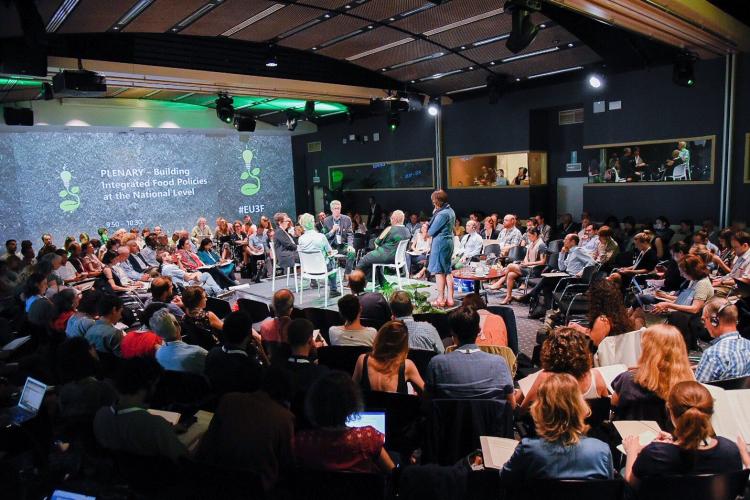Brussels, Budapest and Brighton: Food Secure Canada’s European food policy tour

Photo credit: IPES-Food
By Diana Bronson and Peter Andrée
We recently had an extraordinary opportunity to exchange what is happening on food policy with European and global experts and organizations in trips to Brussels (29-30 May), Budapest (30 May-1 June) and Brighton (June 4-5). Here are some of the highlights of those meetings with links to further resources for people who are interested in knowing more.
Brussels
The first one was the EU Food and Farming Forum in Brussels organized by IPES-Food – the International Panel of Experts on Sustainable Food Systems that has published a number of thought-provoking reports in the past few years. The meeting which attracted over 200 people was an opportunity to discuss the creation of a Common Food Policy for Europe, and recommendations designed to bring it about. The European Union’s (EU) longstanding Common Agriculture Policy (CAP) is criticized by food analysts and activists alike for being expensive (it represents 38% of the total EU budget, but 80% of its direct payments go to just 20% of farmers) unsustainable and highly damaging to developing countries where subsidized exports are dumped below their real costs. The creation of a European food policy, championed, amongst others, by Olivier de Schutter (former UN Special Rapporteur on the Right to Food and co-director of IPES-Food), is seen as a way to break down policy silos and build towards a more healthy and sustainable food system that is equitable, especially to the people involved in growing or otherwise making the food we eat.
People in Europe are watching the Canadian developments in food policy with interest. We were invited to speak at the opening plenary, along with organizations from England and the Netherlands. It was striking to see the similarities in the issues we are facing and to see the same debates amongst civil society actors. How can we make sustainable food affordable? What issues should be tackled first? How can we get more traction for a joined-up food policy and bring more actors around the policy making table? How, as civil society organizations, can we have better access to decision-making and reform the governance of our food system?
How does food sovereignty, the right to food and the sustainable development goals fit into food system reform? At the end of two days of discussion, many organizations had endorsed the idea of a European Food Policy Council, very much along the same lines as we have proposed for Canada.
Budapest
We then went on to the beautiful city of Budapest for the Living Knowledge Forum, which is a mainly European gathering of academics who are committed to community based research. We joined three days of discussions, poster sessions and workshops which examined the power dynamics between researchers and community groups as well as innovative partnership models where community is truly an equal partner in research. For the past six years FSC has been a partner in the CFICE project. There are many rich lessons in how building strong relationships amongst people, with a clear recognition of our purpose and the power dynamics between researchers and practitioners, can deliver truly important results in our quest for a more socially and ecologically just food system. The CFICE network is now actively developing plans to create a permanent network of academics and practitioners who are committed to working together to improve research practices and evidence-based interventions.
Brighton
Our last stop was the sea-side town of Brighton, England where the Institute for Development Studies and IPES-Food co-hosted two days of high level academic discussion on the political economies of sustainable food systems. It was an opportunity to examine some of the complexities of food system reform with some of the world’s top thinkers – including a disproportionate number of Canadians (relative to our overall population). We were joined by Cecilia Rocha (Ryerson University), Charles Levkoe (Lakehead University), Harriet Friedman (University of Toronto) and Paul Uys (Guelph University). Discussion ranged from food riots to agro-ecology, the alternative cooperatives in China and the complexity of systems thinking. Central to all these discussions were questions of power and practice, and how we can best work together, across our own silos, disciplines and geographies to rebuild our food system, so badly in need of reform.
Thanks for the support of IPES-Food and the CFICE and FLEDGE projects for funding our travel!
- Log in to post comments

